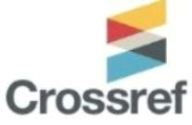- Focus and Scope
- Section Policies
- Peer Review Process
- Publication Frequency
- Open Access Policy
- Archiving
- Publication Ethics
- Screening for Plagiarism
Focus and Scope
- Generator
- Power Distribution
- Electrical Power Convertion
- Protection Systems
- Electrical Materials
- Newreble Energy
Signal, System and Electronics
- Digital Signal Processing
- Robotic Systems
- Micro Electronics
- Embedded Systems
Computer system- Information Technology
- Communication Systems
Section Policies
Article
Peer Review Process
Every article that goes to the editorial staff will be selected through Initial Review processes by Editorial Board. Then, the articles will be sent to peer reviewer and will go to the next selection by Blind Preview Process. After that, the articles will be returned to the authors to revise. These processes take a month for a maximum time. In the each manuscript, peer reviewer will be rated from the substantial and technical aspects. peer reviewer that collaboration with JSE is the experts in the public administration area and issues around it. They were experienced in the prestigious journal management and publication that was spread around the national and abroad.
Publication Frequency
Jurnal Surya Energy (JSE) is published twice in a year; on March and September with eight articles for each edition. It is also published in two versions; print out and electronic.
Open Access Policy
This journal provides immediate open access to its content on the principle that making research freely available to the public supports a greater global exchange of knowledge.
Archiving
This journal utilizes the LOCKSS system to create a distributed archiving system among participating libraries and permits those libraries to create permanent archives of the journal for purposes of preservation and restoration. More...
Publication Ethics
Jurnal Surya Energy (JSE) adheres completely to the publication ethics in article publication.
A. Publication and Authorship
The manuscipt submitted to the editorial will be reviewed by Reviewer Team of Jurnal Surya Energy (JSE) in blind peer-review for the feasibility assessment of article publication.
Authorship credit should be based on:
- Contribution to Electrical Engineering.
- Drafting the article or revising it critically.
- Final approval of the version to be published.
- Agreement to be accountable for all aspects of the work in ensuring that questions related to the accuracy or integrity of any part of the work are appropriately investigated and resolved.
Every author should meet all of these four conditions. After the submission of a manuscript, any changes whatsoever in authorship (adding author(s), deleting author(s), or re-arranging the order of authors) must be explained by a letter to the editor from the authors concerned. This letter must be signed by all authors of the article.
Correction of authorship after publication: Jurnal Surya Energy (JSE) does not correct authorship after publication unless a mistake has been made by the editorial staff. Authorship may be changed before publication but after submission when an authorship correction is requested by all of the authors involved with the manuscript.
- Authors must certify that their manuscripts are their original work.
- Authors must certify that the manuscript has not previously been published elsewhere, and not currently being considered for publication elsewhere.
- Authors must participate in the peer-review process.
- Authors are obliged to provide retractions or corrections of mistakes.
- All Authors mentioned in the paper must have significantly contributed to the research.
- Authors must state that all data in the paper are real and authentic.
- Authors must identify all citation sources used in the preparation of their manuscript.
- Authors must report any errors they discover in their published paper to the Editors.
- Reviewers should keep all information regarding papers confidential and treat them as privileged information.
- Reviews should be conducted objectively, with no personal criticism of the author.
- Reviewers should express their views clearly with supporting arguments.
- Reviewers should identify relevant published work that has not been cited by the authors.
- Reviewers give the recommendation for either acceptance or rejection of a manuscipt after review process.
- Editors have complete responsibility and authority to reject or accept an article.
- Avoiding any conflict of interest with respect to manuscripts they reject or accept.
- Editors are responsible for the contents and overall quality of the publication.
- Editors should always consider the needs of the authors and the readers when attempting to improve the publication.
- Editors should guarantee the quality of the papers and the integrity of the academic record.
- Editors should publish errata pages or make corrections when needed.
- Editors should base their decisions solely on the papers’ importance, originality, clarity, and relevance to the publication’s scope.
- Editors should not reverse their decisions nor overturn the ones of previous editors without serious reason.
- Editors should preserve the anonymity of reviewers.
- Editors should ensure that all research material they publish conforms to internationally accepted ethical guidelines.
- Editors should only accept a paper when reasonably certain.
- Editors should act if they suspect misconduct, whether a paper is published or unpublished, and make all reasonable attempts to persist in obtaining a resolution to the problem.
- Editors should not reject papers based on suspicions; they should have proof of misconduct.
Screening for Plagiarism
Screening for manuscript's plagiarism X checker is still done by reviewers using the application they have. If the reviewers' review shows plagiarism above 25 %, the editor will reject the manuscript.












